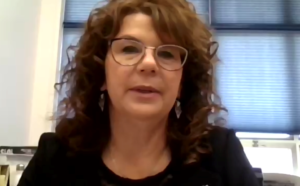Ontario Native Women’s Association educates on Indigenous Anti Human Trafficking

By Rick Garrick
THUNDER BAY — Ontario Native Women’s Association (ONWA) staff Michele Solomon, a Fort William Councillor, and Collin Graham delivered the closing presentation, Indigenous Anti Human Trafficking, at Lakehead University’s Reconcili-action: Learning Truths and Enacting Responsibilities webinar series.
“The underlying focus of this [presentation] is the violence against Indigenous women and the actions and work ONWA does to increase awareness and education about these issues and ensure that we shine a light on these issues for people who don’t know and definitely bring some solutions as well,” says Solomon, community development manager at ONWA, during the Oct. 8 virtual presentation. “Both reports that were discussed today, the Reconciliation with Indigenous Women: [Changing the Story of Missing and Murdered Indigenous Women and Girls] report and also the Journey to Safe Spaces report, have recommendations contained within those reports on how to move away from violence against Indigenous women.”
Solomon says ONWA honours and acknowledges the lives of all Missing and Murdered Indigenous Women and Girls and the voices and experiences of their families, friends and loved ones.
“ONWA also acknowledges all the Indigenous women and Indigenous women organizations whose tireless activism and advocacy over the decades brought much needed awareness to this crisis,” Solomon says. “Without these efforts, there likely would never have been a National Inquiry into the Missing and Murdered Indigenous Women and Girls at all.”
Solomon says the Missing and Murdered Indigenous Women and Girls work at ONWA involves supporting families, cultural reconnection, creating safe spaces, bringing together families and traditional healing.
“The impact on family members has been tremendous,” Solomon says. “Each family that receives support is always very grateful for any help they receive in honouring their loved ones — families request to travel to events where their loved one was murdered or went missing in the hopes of finding something out or meeting someone who may know something, so when we talk about supporting families that’s kind of the things that are happening with people when we do offer that support.”
Graham, community development manager at ONWA, says his key messages about Indigenous Anti Human Trafficking are about raising awareness and having conversations to eliminate human trafficking among Indigenous women and girls.
“When it comes to this work around trafficking, predominantly what we have been seeing especially amongst Indigenous women, is it is presenting as sex trafficking,” Graham says, noting that they are seeing four main areas of sex trafficking, including familial-based trafficking, organized or gang-facilitated trafficking, substance dependency-driven trafficking and economically-driven trafficking. “We are seeing more of these kinds of [economically-driven trafficking] activities happening predominantly in the north where there is a lot of resource extraction.”
Denise Baxter, vice-provost Indigenous Initiatives at Lakehead University, says the two-week Reconcili-action: Learning Truths and Enacting Responsibilities webinar series, which ran from Sept. 27-Oct. 8, featured presentations by “excellent resource people” from the region.
“They do really important work and if we don’t provide space for people to bring these forward, not everybody goes looking for this,” Baxter says. “So we kind of make it easy by saying: ‘Hey, come and join us over your lunch hour,’ because reconciliation and the action part of reconcili-action looks many ways and there’s many layers of different reports that all come together when we think about what this means in order to learn so people can make decisions and critically think about their actions and their words and their power to make change.”
The webinar series began with a Sept. 27 keynote by Alongquins of Pikwàkanagàn First Nation’s Lynn Gehl on Reconcili-action: Learning Truths and Enacting Responsibilities and a Sept. 28 presentation by Biigtigong Nishnaabeg’s Nicole Richmond on Treaties, Curriculum and Anishinabe Pedagogy. Chippewas of Georgina Island’s Cynthia Wesley-Esquimaux, chair on Truth and Reconciliation at Lakehead University, also delivered a Sept. 30 presentation on Looking Back, to go Forward.


